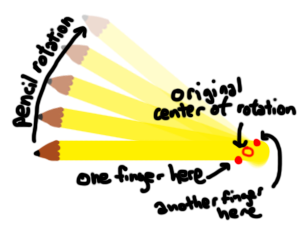If I hold a pencil at its end and spin it, throwing it upwards, it will spin about its end, but will soon start spinning around its center. How is this?
I would draw the following torque diagram for while it's in the air:
- Object: uniform thin rod with length $\ell$ and moments $I_{center}=\frac 1 {12} m\ell^2$ and $I_{end}=\frac 1 3 m\ell^2$)
- Center of rotation some small distance $d$ from the end
- Torque $m\vec g$ downward, at center of mass, with $\theta = 90°$ and $r = \frac \ell 2 - d$
- Possibly wind resistance $\vec D$ upward, at center of mass, with $\theta = -90°$ and $r = \frac \ell 2 - d$
Thus, $\vec \tau = \sum {\vec r \times \vec F} = \sum {rF~sin\theta} = \left (\frac \ell 2 - d\right)(m\vec g - \vec D)$. I could see how this might cause it to spin, but how does the center of rotation to move?
EDIT: Here's a picture because apparently I wasn't clear. It definitely is spinning around the end (or close to it, anyway) before I release the pencil.

